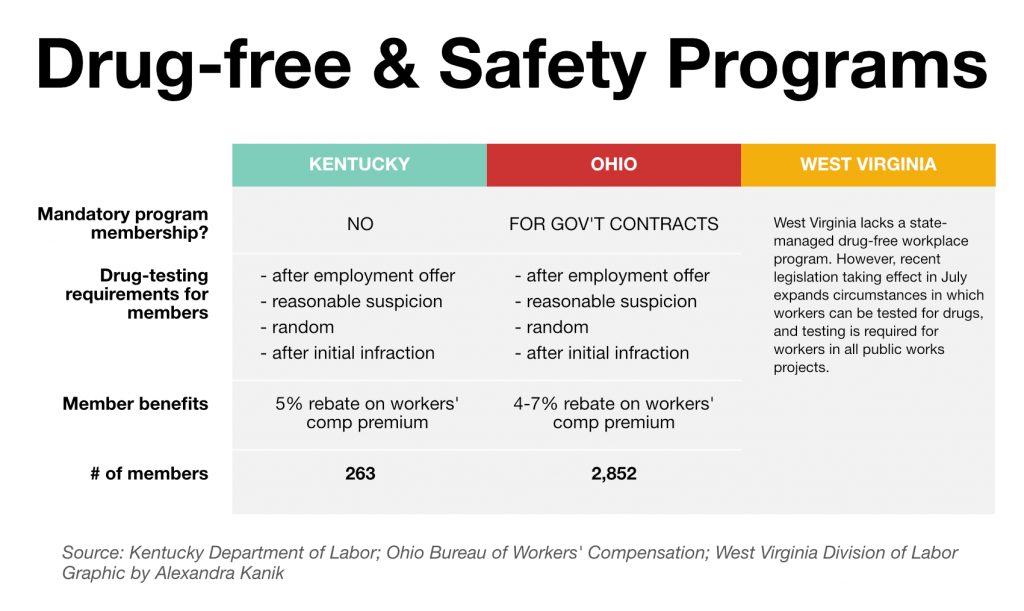http://ohiovalleyresource.org/2017/06/30/working-addiction-employers-face-opioid-crisis-workforce/
If you’ve ever enjoyed a Budget Saver twin popsicle on a hot summer day, you can thank the employees of the Ziegenfelder frozen treat factory in Wheeling, West Virginia.
Floor operator Sonny Baxter keeps the line of popsicles going in the cherry-scented worksite.
“You have to have a comprehension of how the line works, how to make them run as smooth as possible” he said. “You have to supervise the line workers that are bagging the popsicles. You’re a friend. You’re a leader.”
But Baxter’s job goes beyond keeping the popsicle line moving. He also uses the training in addiction counseling he received outside of work to help Ziegenfelder employees who are in recovery from addiction and re-entering the workforce.
“You have to really have a healthy level of empathy for people from different circumstances and different environments,” Baxter said.
Addiction specialists say employment helps in the recovery process. And here in one of the areas hardest hit by the addiction crisis, some employers are stepping up their efforts to bring these people back to work in hopes of chipping away at the epidemic.
Facing a Crisis
Ziegenfelder embraces its role in this effort.
“Businesses really need to step to the plate and participate in changing our environment,” President and CEO Lisa Allen said. “We don’t necessarily go out and search for a certain person re-entering. We search for great people.”
 Courtesy Ziegenfelder Frozen Treat Co.
Courtesy Ziegenfelder Frozen Treat Co.Ziegenfelder CEO Lisa Allen wants businesses to “change the environment” of the addiction crisis.
The company estimates that around a third of their employees come from a local temp agency and some of those employees were on probation and living at the local halfway house.
Ziegenfelder managers also knew some of their long-term employees had a “background.” But they did not take an interest in those workers’ stories until several years ago.
Production Manager Matt Porter saw the toll the opioid epidemic was having on the Ohio Valley. He said he felt the company could be a force for change by giving people affected by the crisis another chance.
“Whether we chose to face it head on and realize that there’s an epidemic going on in the Ohio Valley or we ran from it, ultimately it’s going to find us,” he said.
That thinking led to the decision to become a “Drug-Free Workplace.” The company takes measures to avoid drug-related hazard while offering assistance instead of punishment to employees who approach them about their struggles with addiction.
Loyal Employees
An consultant agency based just outside of Columbus, Ohio, is working to help companies implement drug free workplace policies.
Working Partners tailors these policies to meet the needs of both major corporations and small businesses.
Working Partners advises employers to protect themselves from liability. But companies should also offer a helping hand rather than a slap on the wrist to employees who approach managers about addiction.
CEO Dee Mason believes it’s ethically the right thing to do. But there are also economic benefits for the employer.
“If that person stays the course and you’ve actually thrown them a life ring, those people will come back and be some of the most loyal employees you’ve got,” she said.
She said a good policy consists of five elements:
- – A legal document outlining detailed procedures
- -A drug safety education program for employees
- -Training for supervisors to detect the signs of addiction in employees
- -A system for drug testing
- -An Employee Assistance Program for when treatment is needed
Mason said employers see the benefits of this approach when it is explained “in a language that they understand, which is ‘Let’s do the math.’”
A 2009 study in the journal Psychiatric Services found that when an employer pressures an employee to seek addiction treatment, it “gets people to treatment earlier and provides incentives for treatment adherence.”
When the employee returns from treatment, the employer saves “up to $2,607 per worker annually,” according to survey results posted in March by the National Safety Council. The savings are estimated based on missed work days and healthcare costs incurred by employees in active addiction.
 Alexandra Kanik | Ohio Valley ReSource
Alexandra Kanik | Ohio Valley ReSourceOther benefits for employers include a discount on workers compensation insurance premiums in certain states (in Ohio and Kentucky) and the opportunity to take government contracts.
West Virginia lacks a state-managed drug-free workplace program. However, recent legislation taking effect in July expands circumstances in which workers can be tested for drugs, and testing is required for workers in all public works projects.
The opioid epidemic has increased demand for Working Partners’ services in both urban and rural areas. Mason said rural communities present unique challenges in getting employees treatment.
“We’re raising the awareness of the employers. But now we’ve got to figure out how to find services that they can rely on. There aren’t enough services,” Mason said.
NOTE:
There is a decline of employment opportunities in what used to be called the “middle class” thanks to automation, technology, artificial intelligence & robotics. John Wayne famously said; “Life’s tough, it’s even tougher when you’re stupid!”. Addiction is yet another burden that so many of those genetically predisposed to end up afflicted with. It’s clearly a debilitating disease. I’m so thrilled when employers go out of their way to give a hand-up to those in need. A hand-up is so much better than a hand-out! An important thought to keep in mind, is that when somebody goes in for addiction treatment and has no personal financial responsibility, they have no “skin in the game” and a higher rate of relapse. It’s simple human nature, taking the inherent character flaws of an active addiction sufferer in the throes of their disease and giving them “free” treatment is something like throwing gasoline on a fire. It’s counterproductive!
- COVID UPDATE: What is the truth? - 2022-11-08
- Pathologist Speaks Out About COVID Jab Effects - 2022-07-04
- A Massive Spike in Disability is Most Likely Due to a Wave of Vaccine Injuries - 2022-06-30


